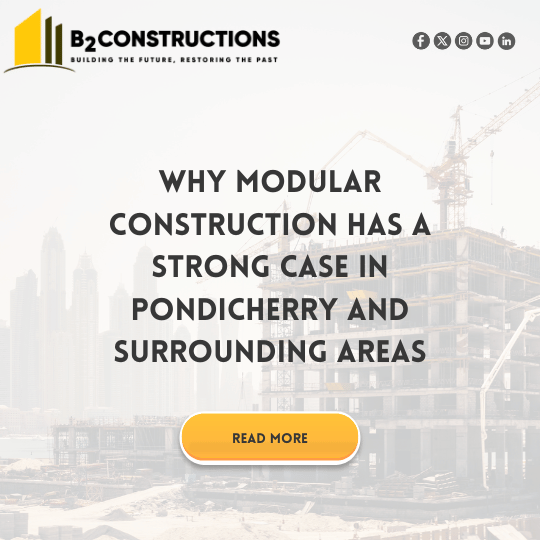
Speed of Construction
Since components are built in factory, module construction and on-site work may be done at the same time, reducing overall construction time.
For developers, faster turnover means earlier returns, which is essential in real estate and tourism sectors.
Quality and Standardization
Factory conditions are more controlled for materials, finishes, structural integrity, and moisture protection etc. (important near the sea due to humidity, salt corrosion etc.)
Less weather-sensitive (rain, humidity) that in coastal Tamil Nadu / Pondicherry can delay site work.
Less waste, sustainability
Less waste of material, less resources lost. Prefab is less likely to generate onsite waste.
Potential for better energy efficiency, insulation etc., if well designed.
Cost predictability and reduced Labour requirements On-Site
Labour cost, labour shortage delays or site inefficiencies may decline.
Less surprise due to cost overruns because of better planning, less exposure to weather, etc.
Growing Market Demand / Policy Initiatives in India
India’s prefabricated / modular building industry is growing. Various reports indicate growth in those sectors.
Government initiatives (e.g. low-cost housing, green building, smart city) increasingly encourage faster, more sustainable methodologies. Prefab is the answer.
Local Awareness and Representation
There are modular showrooms / facilities in Pondicherry (e.g. GM Modular showroom) which is indicative of some underlying infrastructure or market awareness.
Prefabricated hospital / clinics etc. already in the market.
Challenges and Problems in the Local Context
However, there are some factors that can hinder or slow down adoption in Pondicherry and neighboring regions:
Initial Investments & Factory / Supply Infrastructure
Setting up prefab / modular factories, having reliable supply chains for modules/materials is expensive. For small developers it becomes an obstacle.
Transport logistics: delivering large prefabricated modules to site requires decent roads, specialized handling machinery, etc. Sea-coast or semi-rural areas have poor connectivity or few roads.
Regulatory, Zoning, Building Codes
Local building codes may not yet have caught up with modular/prefab methods. Permits, inspections, approvals may be delayed or questionable.
Coastal regulation zones (CRZ), environmental zoning may have special restrictions.
Design Flexibility & Architectural Requirements
Modular systems sometimes restrict certain shapes or complex designs. For people who want customized or complex architecture, prefab does look restrictive.
For luxury homes/heritage buildings etc., prefab may not be easily adaptable in aesthetics.
Perception, Market Acceptance
Others will still have the perception of modular / prefab being “lower quality” or “temporary” though that is changing. That stigma needs to be broken.
Resale value, local climate durability (humidity, storms, etc.) needs to be demonstrated.
Skill and Workforce
Need specialized manpower for fabrication of modules, assembly, finishing etc. Transition from traditional onsite construction to industrialized construction needs diversified skills. Lack of trained manpower can be an issue.
Cost Competitiveness at Times
Where small projects or where sitework, transportation etc., are difficult, the cost benefit may not outweigh the overheads. There can be possible costs of logistics, site preparation, module movement.
Climate & Maintenance Problems
The sea climate (salt air, humidity) can be harsh. Proper care has to be taken while choosing apt materials, coatings, insulation etc.; otherwise maintenance cost could be higher.
Modules should be well sealed, well ventilated etc.
Information specific for Pondicherry & areas nearby
Adding the above to what is specific for Pondicherry and its surrounding location
Coastal weather, cyclone / storm hazard: Prefab units must be made wind resistant, rain and salt spray proof. Buildings will have to account for corrosion, ventilation, insulation, etc.
Urban v/s rural blend: Land is a luxury in urban Pondicherry; construction speed is valuable. In rural settings, connectivity and transportation can be poor; prefabs might have to be strategically located.
Tourism & seasonal demand: Guesthouses, holiday homes, resorts could be helped by modular buildings (not too difficult to build, alternative to permanent & semi-permanent). Could be a growth opportunity.
Regulatory environment: Pondicherry has its own municipal laws; also coastal zone laws. How much the authorities are aware of the modular approach will dictate how quickly the approvals can be sanctioned and what terms they come with.
Materials & Labour in Tamil Nadu: Tamil Nadu has decent infrastructure comparatively, but the cost of logistics to move modules may be significant depending on the location. Steel / shipping etc cost could also affect if prefab is financially feasible.
Local suppliers / established enterprise: With a GM Modular showroom, there is some supplier capacity or interest already existing. That is welcome news.
